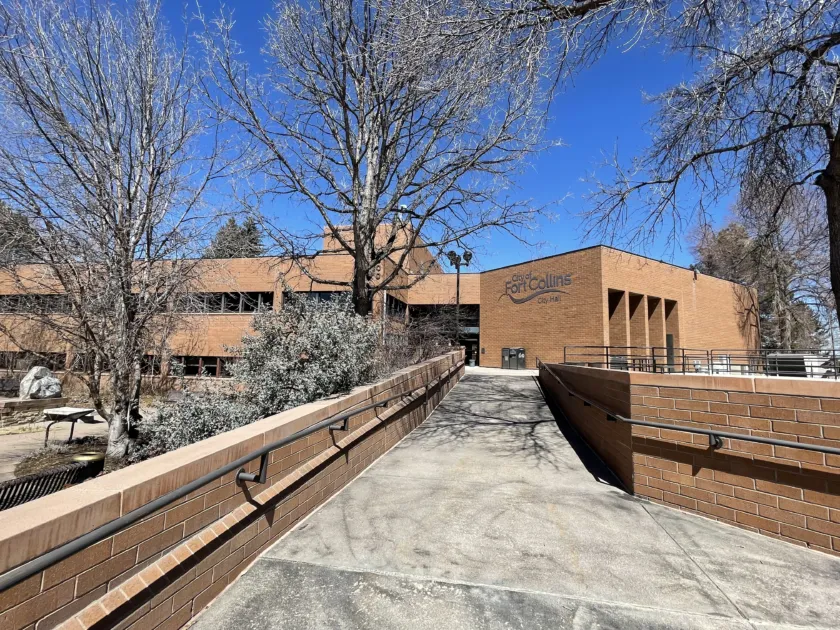NoCo airport to decommission 4 hangars, displacing 47 planes

LOVELAND – The governing commission of Northern Colorado Regional Airport has voted to decommission four of its hangars, displacing the aircraft of 47 tenants at a time when storage spaces for the small planes is scarce along the northern Front Range.
The decision was made late Thursday in a special meeting called with three days’ notice, and the vote was held in the open after the panel held an executive session.
“We’d been trying to extend their life for years, so this was no surprise,” Don Overcash, who chairs the commission and also sits on the Loveland City Council, told BizWest on Friday about the hangars being retired. “We received additional information and felt it was important to act prior to the next regularly scheduled meeting to give as early notice as we could, once we became aware of the engineering safety concerns.
SPONSORED CONTENT
“We’d been working on this for a while,” Overcash said. “This discussion has been going on since 2007. We’ve been trying to extend their life for years.”
The hangars, built between 1965 and 1977 by private developers, were deeded to the cities of Loveland and Fort Collins, the airport’s joint owners, after long-term leases had expired. The airport has been leasing the hangars to private aircraft owners on a month-to-month basis since 2020. The four buildings contain 57 usable hangar units with 64,500 square feet of storage space and house the aircraft of 47 individual tenants.
According to a news release issued by the airport, it said it “has been able to extend the usage of these buildings to maximize their available lifespans but can no longer be supported by the cities due to multiple factors that are due to age and deterioration.
“The area has been identified as a location for redevelopment, first introduced in the 2007 Airport Master Plan and reiterated in the 2020 Airport Master Plan, both of which involved significant public outreach and adoption by both City Councils,” the release said. “A gradual phase-out of these units was originally intended to ease the impact on tenants and allow for new hangar development to take place; however, a structural analysis of the buildings identified structural concerns, limiting their time for use.”
Depending on the hangar, he said tenants had until May 10 or July 10 to vacate the buildings.
To assist with relocation efforts, the airport will provide temporary outdoor tiedown spaces for affected aircraft.
“We don’t own any other hangars. We inherited these,” Overcash said. “And they’ve exceeded their lifespan.”
However, Martin Lind, who heads the Water Valley Land Co. and has worked independently of the airport commission to secure funding for a U.S. Customs office near the airport, said he talked to aircraft owners who “had tears in their eyes” over the prospect of storing their planes outdoors.
“They have nowhere to go,” Lind said. “There’s waitlists at every airport, and hail season’s starting.”
The airport commission said it also would supply trash and recycling support and assist tenants in finding new aircraft storage arrangements. The panel also requested that tenants unhappy with the decision should provide it with alternatives at the next regularly scheduled meeting on April 20.
“We’ve encouraged groups to band together and make a proposal,” Overcash said. “We’re able to grant 50-year land leases at the airport, and the land is relatively inexpensive, to form their own associations and form business units to build the hangars. The hangars have been built by private development. It’s not an airport function to build hangars.
“Hangars are in great demand,” he said. “So, fine. Go to the bank, get a loan, build a group, bring us a plan at the next regular meeting and let’s see what we can do.”
The airport has plenty of land available on which developers can build hangars, Overcash said. “The lack of land is not the issue.”
Lind countered that his company had submitted a request for proposals “to rebuild all those hangars last year and keep those tenants in place. They made us revise the RFP and then didn’t act on it.”
Overcash noted that some new hangar facilities are under construction at the airport, with completion anticipated this year. But he acknowledged that hangar space up and down the Front Range is hard to come by, adding that “private development hasn’t stepped in to help.”
One problem, he said, is cost.
“The cost of steel has increased tremendously in the last two or three years,” he said. “They’re now costing about $120 a square foot, and most of the hangars are about 1,000 square feet.
“Right now, tenants get a great deal. The hangars aren’t much,’ Overcash said. “They put their airplane in there, and the costs range from around $250 to $310 a hangar per month. That’s pretty cheap storage. But the new ones will be much more expensive because of construction costs. We’ve got new ones going up, but again that’s private development. They build them and they rent them out.”
Airport director Jason Licon acknowledged that the timing for the commission’s action is “unfortunate but necessary.” In a prepared statement, he noted that “we have done all that we can to extend the lifespan of these facilities to maximize the value for those using them,” and that “we are committed to making this process as smooth as possible for displaced tenants.”
Lind said the timing of the decision could also be a problem for the airport because the Fort Collins City Council is poised to give second-reading approval Tuesday on a plan to kick in $1 million to fill a funding gap for a new airport terminal, which the commission believes is important to restore scheduled passenger flights that were lost in recent years when Allegiant and Avelo airlines pulled out.
“Fort Collins has to vote on the terminal next Tuesday,” Lind said, “and a huge amount of people are unhappy.”The airport has published information on its decision on its website at http://www.flynoco.com/airporthangars, and a public town hall will be held at 3:30 p.m. Thursday, March 9, at the jetCenter, 4824 Earhart Road in Loveland.
LOVELAND – The governing commission of Northern Colorado Regional Airport has voted to decommission four of its hangars, displacing the aircraft of 47 tenants at a time when storage spaces for the small planes is scarce along the northern Front Range.
The decision was made late Thursday in a special meeting called with three days’ notice, and the vote was held in the open after the panel held an executive session.
“We’d been trying to extend their life for years, so this was no surprise,” Don Overcash, who chairs the commission and also sits on the Loveland City Council, told BizWest on…





